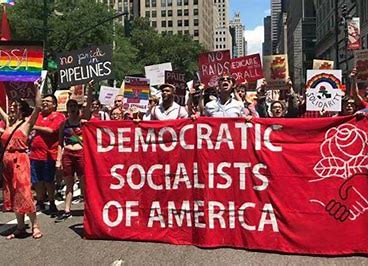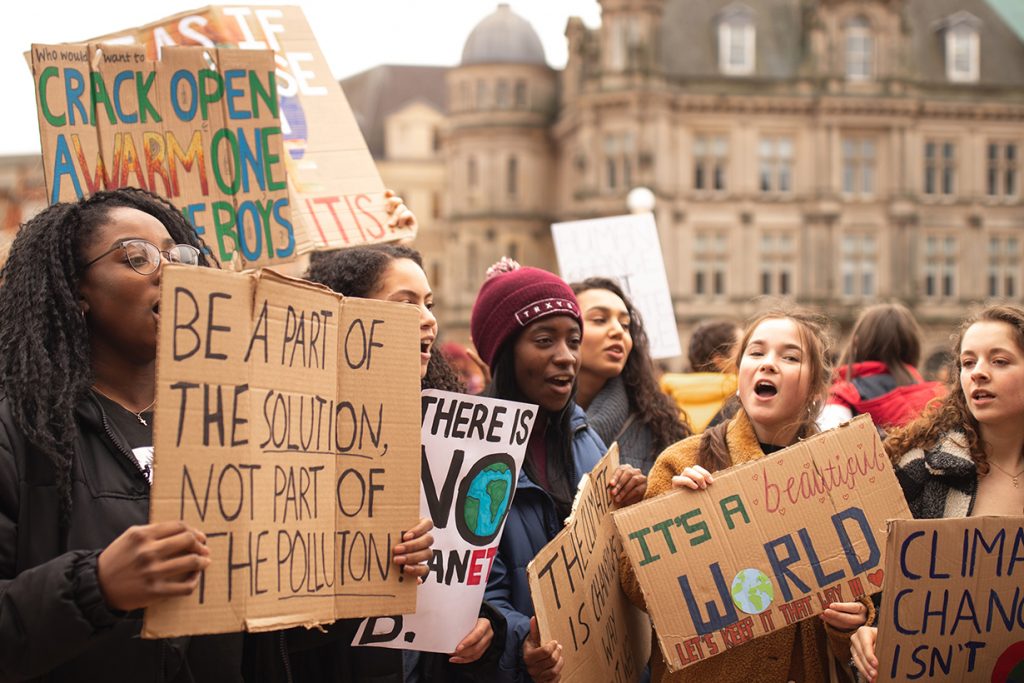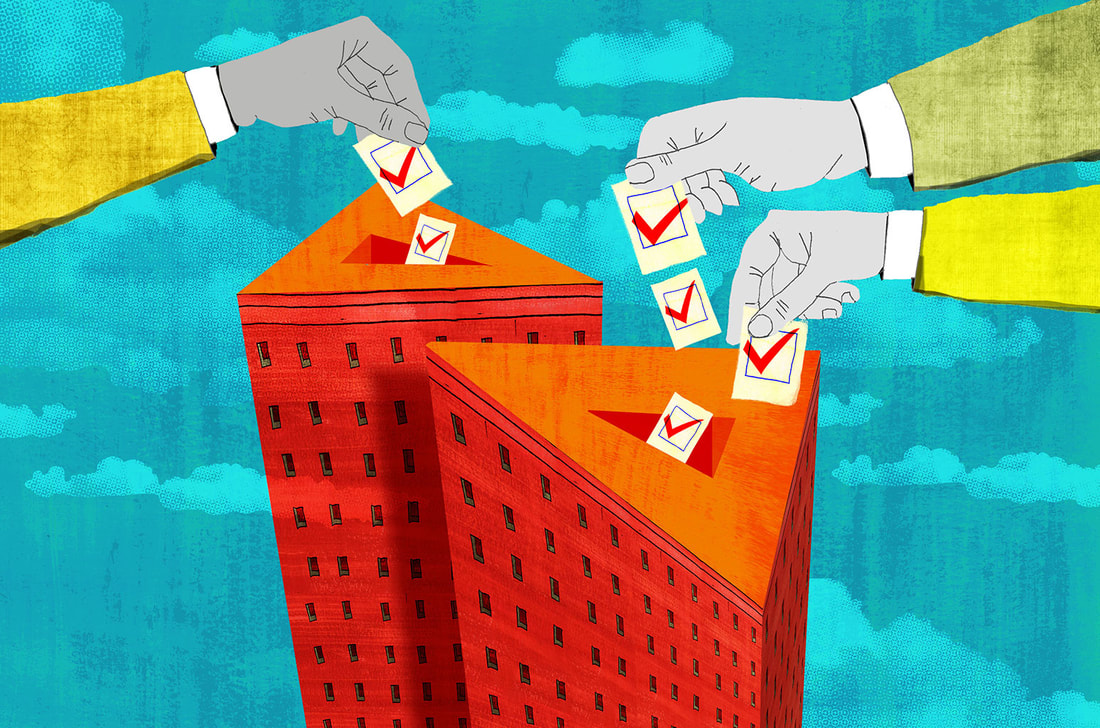|
By: Ira Sharma In the last few years, there has been a huge shift in the Democratic party leftwards. 2020 candidates for the primary increasingly embraced policies known as “too far left” historically, and there became an important distinction within the party if someone was a leftist or a liberal. This raises the question, what even is a leftist, how are they different from a liberal? Both liberals and leftists agree on a few things but actually disagree on most everything. A few of the major disagreements of the two start with the economy: Liberals believe that capitalism isn’t inherently evil, and can be reformed. Leftists, on the other hand, believe that capitalism is an oppressive system that cannot be reformed. In this same way, liberals believe our system is broken and needs to be fixed, while leftists believe that the system is working exactly how it’s intended to, as an oppressive force and that it needs to be destroyed. Elizabeth Warren, a prominent liberal, once said, “I am capitalist to the bone… I believe in markets and the benefits they can produce when they work. I love the competition that comes with a market that has decent rules… The problem is when the rules are not enforced when the markets are not level playing field, all the wealth is scraped in one direction.” Leftists' view on how the economy should be run varies, with some identifying as socialists, others communist, and a few anarchists. Socialism, the most common kind of leftist here in the U.S., is defined as when workers control (at least some) of its means of production, such as infrastructure, energy, etc. On the contrary, capitalism allows for private owners to control the means of production. In the same sense, many socialists call for the complete ban of the private sector and discuss different ways to achieve this. This is at odds with the capitalist view of free markets for freer people. Another major difference is in patriotism and country. and Liberals believe that patriotism is a positive force and that a patriot makes sure their country lives up to its ideals and values. Leftists, on the other hand, counter that patriotism is irrational, and believe that it is a force on the road to fascism. This adds to the point that liberals believe in the concept of nation, while leftists believe nations have no place in modern society. Many modern leftists advocate for global citizenship rather than allegiance to a country. However, there is a rift in what many leftists believe about the modern-day nation-state, with many leftists advocating for the state advancing revolutionary struggles, and others viewing no need for a state at all. The struggle between leftism and liberalism are apparent in today’s Democratic party, with moderates warring against newfound socialists like Rep. Alexandria Ocasio-Cortez. The party finds itself split between centrist, right-down-the-middle policies, and revolutionary legislation like the Green New Deal, the likes of which has never been nearly as mainstream. While these are just a few of the differences between the two, liberalism and leftism are very different ideologies that disagree in many more ways.
0 Comments
By: Alina Gao The stereotype for teenagers is they’re weird and awkward and reckless, which is true, but also not. Sometimes there are extenuating circumstances that prevent us from being those things. As a young child I was made to believe that myteen years were my own years. They were mine to make mistakes and laugh and have fun because I was young and scared and stupid. Adults look at teens with regret disguised as scorn and call us lazy, sensitive, ignorant. But I look at the laundry list of everything wrong with this world, a daily ritual to keep me moving for the future, and you can’t go back. Black people dying, police brutality, the world hurtling to its own demise, climate change, sexism, r*pe accusations disregarded, capitalism corrupting this society, and I feel scared. I think about these topics, watch the news, listen to the radio, dig my nails into my palm, trying not to be consumed by fear. I feel hopeless, stressed, and restrained like I’m pushing back but inside I’m just resigned to the inevitability. Adults look at us and say “You young people are the future! You’re going to save the world!” and I want to scream back “No we’re not, we’re the present and so are you! We’re all in the present so why aren’t you doing anything, why aren’t you helping?” But, of course I still try to do my part. I go out and sign up for a youth activist group and clubs for sustainability and I do all these amazing things with all these amazing people. I go home and CBC news is there, headline reporting BREAKING: EIGHTEENTH TRANS WOMAN KILLED THIS YEAR. Adults say they’re relying on us and then say “Children are too young to know about homosexuality” as if I didn’t sharpie my arms with rainbow and fight with bigots in the YouTube comment section. Our generation is the gayest, most trans, racially diverse, atheist generation ever and we’re going to change the world. Or we’ll literally die trying. Generation Z has disregarded stereotypes. We are not black and white. There’s diversity and originality. We know cliques and stereotypes don’t mean anything in the name of self-expression. We have moved past what we are supposed to be, and started creating a new world. Our dreams of this world is where people aren’t dying because of the color of their skin, all ethnicities are treated with human decency, greedy corporate companies are forced to change their ways, the world isn’t on its way to imploding from climate change, animals aren’t suffering because of humanities, and everyone can just exist. But we also know what’s possible. Worldwide pandemics, faceless government security, military style police brutality, white superiority, forest fires raging. I think about this and I am deeply afraid. Everyday I’m getting more and more annoyed at capitalism and social inequality and corruption. People dying for things they couldn’t and can’t control. Some adults tell me “Well, it’s up to you to change it!” but some look at me and say “That’s just the way the world works” but guess what? I refuse. I will not sit back and observe the world going up in flames and do nothing. I will not turn to the next generation and say “It’s up to you now” or “That’s just the way the world works.” I will do what I can and then I will turn to them and say “This world sucks, but we’re going to change it. Come on.” There’s a reason we’re called Generation Z. We’re the last chance, the last line of defense, for this world. But you know what? I’m just really tired. By: Bonne Leung We are well into election season now, both in real life and, coincidentally, at school. While I don’t live in the United States or even have citizenship there, I can’t help but hold my breath and refresh the Google page where the live results are being reported. As of now when I’m writing this, Biden has yet to tip over the votes to win, and to be honest, I can’t help but think how this election could affect the rest of the world. I worry as someone who lives hundreds of kilometers away — I can’t imagine what it must be like knowing the place you live in is the epicentre, preparing for some cataclysmic event that might upend the foundations of your life. And at school, it’s not any different. Election season is rolling in and everyone is talking about who they think will make it to the new Student Council Cabin for the 2021-2023 term. I don’t know if that’s the case for everybody, but certainly at my school, everybody knows somebody who knows somebody who’s campaigning for one of the five positions on the council. More or less, election season at my school doesn’t feel so different to the actual election — given the elaborate schemes and scandals that candidates are faced with leading to voting — albeit with less ripple effects should the elected Chairperson have some radical idea to eliminate our school uniform. The worst the student body would fare under tyranny would probably just be parental complaints and then some drama involving an impeachment or resignation, but nothing like the effects the future President of the United States has. But be it a major election with real life repercussions or one within your school community, sometimes the constant pressure of having to keep up with all the news outlets and polls can be overwhelming. If you feel that way, don’t feel that you’re being politically apathetic or dramatising your situation because that isn’t the case at all. In fact, 68% of people in the United States alone report that they feel significant stress over the election. For me, I like to dive straight into the fray to figure out what I can find out to put my mind at ease. But that isn’t the case for everyone, and perhaps you just need an hour or two to keep your mind off the election and evade the feeling of wanting to implode. So here, a list of movies to watch. It has both movies with significant political memorabilia or outright dumb charm. I created this list with the following criteria in mind: political-ness (how political is it), ignorability (could you just use it as background noise), and dumb charm (the level of which it achieves the ‘not a great movie but is charming nonetheless’ vibe). Disclaimer: I haven’t seen all these films, though I solemnly swear that I have done thorough research on all of them and read multitudes of reviews. 1. On the Basis of Sex (2018) Armie Hammer and Felicity Jones in a scene from “On the Basis of Sex.”(Jonathan Wenk / Focus Features) I’m ashamed to say that I’ve never watched this film. I’ve been fervently reading about Ruth Bader Ginsburg since I read her name in the Roe v Wade case whilst researching for a debate when I was twelve. While the film’s climax isn't on the Roe v Wade case, Felicity Jones delivers a moving performance of the late Supreme Court Justice and her struggle against misogyny as well as both her personal and professional life intermingling. However, if you’re looking for a completely factual account of Bader’s life and achievements, I would recommend the documentary ‘RBG’ which is an informative and loving portrayal of her life. ‘On the Basis of Sex’ is more so a biopic with a few fictional scenes such as *spoilers* Bader’s flubbed opening statement. Ratings: Political-ness: 8/10, it’s somewhat factual but not completely, however, from what I’ve seen the Commissioner v Moritz case is fairly accurate. Ignorability: 3/10, one does not ignore the Notorious RBG. Dumb charm: 0/10, nothing about discrimination is dumb, but it is a very charming and heartwarming film. 2. Marshall (2017) Chadwick Boseman, above centre stars as a smart, cocky, gifted and charming young lawyer fighting prejudice and injustice in “Marshall.” Barry Wetcher / Open Road Films ‘Marshall’ is another biopic film about an Associate Justice, this time focusing on Thurgood Marshall, the first African American to have ever held a seat on the Supreme Court. Portrayed by the late Chadwick Boseman, Thurgood is a jaunty and self-assured civil rights lawyer who aids in a case in which a black man is accused of sexual assault. It’s impossible to not get caught up in this courtroom drama filled to the brim with stirring speeches as well as a good sprinkling of bromance between Marshall and the local attorney, Sam Friedman. The script was written by father-son duo Michael and Jacob Koskoff, the elder of which is a civil rights lawyer and brought insight to the case that otherwise would have been overlooked and has a sense of realism. Ratings: Political-ness: 9/10, Thurgood Marshall was a revolutionary who brought down segregated schools and changed the lives of many. It’s a good film to watch to educate yourself more on black history and the fight for equality beyond the hashtags on social media. Ignorability: 2/10, Boseman delivers a captivating character and the courtroom drama itself with dramatised exclamations of ‘objection!’ is hard to ignore. Dumb charm: 0/10, there is no space for dumb charm in the face of Thurgood Marshall’s suave debonair personality. 3. Clueless (1995) Alicia Silverstone as Cher and Stacey Dash as Dionne in 1995's "Clueless." Elliot Marks / © Paramount. Ah yes, the cult classic film that launched Alicia Silverstone’s career on the big screen. If you didn’t know, ‘Clueless’ is a film about a teenager’s match-making gambits as she roams the halls of her Beverly Hills high school while obsessing overher own status. Behind the frilly facade, ‘Clueless’ is a satire of the teen movie genre and is actually based on the Jane Austen book ‘Emma, believe it or not’. It chronicles a coming-of-age story of a girl who was more or less stuck in her own glamorous bubble with performative “acts of charity” in which protagonist Cher Horowitz gives a new student a makeover. However, it does have some important life lessons, such as the importance of friendship (the message of female friendship and being supportive of other women is a big one), consent, and of course, don’t settle, be it for grades or otherwise. Ratings: Political-ness: 7/10, messages still apply now but there are some stereotypes within the movie that would do well to be avoided. Ignorability: 7/10, a perfect flick to put on for background noise while being interesting and easy-to-follow enough to look up once in a while and still understand what’s going on. Dumb charm: 8/10, there’s a certain charm to Silverstone’s portrayal of a girl that walks the razor edge between the stereotypical ‘dumb blonde’ or incredibly intelligent young woman. 4. Irresistible (2020) Rose Byrne stars as Faith Brewster and Steve Carell as Gary Zimmer in Jon Stewart's 'Irresistible' / Focus Features. If you’re ready to dive straight into the fray, this film is the one for you. ‘Irresistible’ is a political comedy about a smooth D.C. political consultant who needs to recover his image after failing to deliver Hilary Clinton to the White House in the 2016 election race. He decides that a widowed farmer arguing for immigrant rights would be the perfect candidate for major and the balm to his injured reputation. It’s a political drama with subtle satire and a strangely nostalgic feel. Ratings: Political-ness: 9/10, it does reflect on the 2016 election and also has a good dose of classic campaigning on top of the satire and plunging of hands into cattles’ rears. Ignorability: 7/10, as far as I can tell, it’s not quite as captivating as a normal political drama should be, and with Steve Carell’s dry humour, it seems like a good movie to unwind and play in the background. Dumb charm: 6/10, while the jokes can sometimes fall flat, the sarcasm and slapstick comedy is charming in its own way. 5. The Good Place (2016) Heavenly creatures... Jason, Janet, Michael, Eleanor, Chidi and Tahani / Photograph: NBC/Getty Images. Personally one of my favourite TV shows ever, it’s about a group of four humans on their journey trying to navigate the afterlife. Not all is as it seems and it makes for a lighthearted watch with many quotable lines. The humour is quite wry and all of the characters on screen have in-depth personalities that all audiences can relate to, rooting for each to find their own happiness after their time on Earth. However, the show does do a good job of incorporating ethics as well as subtle political intricacies, prompting us to use the lessons laid out to reflect on our political leaders and their policies. Ratings: Political-ness: 6/10, it’s more ethics and weird afterlife hyperbole than actual politics, but there’s a fair dosing of both. Ignorability: 9/10, now, the high rating does not necessarily mean it’s a bad show, there are some moments that make me howl laughing and others that make me sob, and I could do all of that whilst focusing on painting a rendition of the statue of David’s hand. Dumb charm: 8/10, the humour is quite immature sometimes but it’s just so charming— it’s the type of show where you always end up loving everyone in the cast. 6. The Politician (2019) Courtesy of Netflix Another political satire, this time with Macbethian undertones, about ambition and stopping at nothing to achieve what you want. It follows charming and determined Payton Hobart, who has aspirations to become the next student body president and will stop at nothing to win his race against equally charming albeit less ruthless River Barkley. It’s a coming of age story that doesn’t forget any character nor their individual storylines. It’s somewhat of a refreshing take on politics, certainly in season one where the election takes place within Payton’s school, which parallels real life elections, armed with presidential debates as well scandalous voting ballots. In season two, it goes bigger, and the stakes higher, as Payton runs against experienced congresswoman Dede Standish for the New York Senator seat. Ratings: Political-ness: 9/10, for its portrayal and exaggeration of elections and politics, though how exaggerated it actually is is questionable. Ignorability: 5/10, while you can leave it playing while you scroll through social media, you probably wouldn’t want to look away, and some parts of the plot, especially the political schemes, require some attention. Dumb charm: 0/10, it lacks dumb charm but the witty lines and spitfire characters make for a charming binge. |





 RSS Feed
RSS Feed
